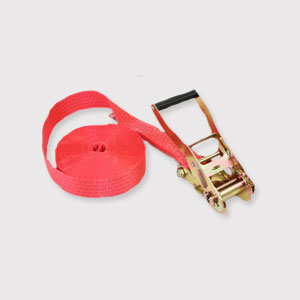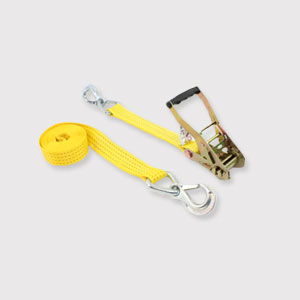It is best to choose your lashing straps according to the type of application. While the tensioning forces (STF) are important for classic tie-down lashing, the required lashing capacity (LC) is more important for direct lashing / diagonal lashing with lashing straps. The corresponding values are shown on the labels of our lashing straps.
Labels and tags
All our lashing straps are provided with labels that have the most important performance characteristics are printed on them. This ensures faster processing and shorter downtimes, especially during official inspections. The label or tag is located at the end of the lashing strap (at the short and long ends in the case of two-part lashing straps) and contains the following information: Lashing capacity (LC value) in daN, standard hand force (SHF) in daN, standard tension force (STF value) in daN, a warning, the material specification, the elongation of the strap in % value at LC value, the name or symbol of the manufacturer, a traceability code, the standard specification (EN 12195-2) and the year of manufacture.
There are two basic types of lashing straps – single-part and two-part.
 Lashing strap single-part
Lashing strap single-part
 Lashing strap two-part
Lashing strap two-part
The single-part lashing strap consists of a webbing strap and a tensioning element (ratchet or clamping lock). It is primarily used for bundling or strapping cargo parts to form a load unit. The two-part lashing strap consists of the short end and the long end. The non-adjustable short end consists of a short strap with a tensioning element (ratchet or clamping lock) and an end fitting (e.g. hook) as a connecting element. The long end is a long strap to which an end fitting is attached as a connecting element.
The most common end fitting is a two-finger hook, which is used in trucks, trailers and transporters. End fittings that fit directly into the lashing tracks sold by LaSi24 are a little more specialised. These end fittings for tension straps can be hooked directly into the airline tracks, anchor combi tracks and tracks with pins, thus enabling quick and efficient use. In addition, we offer edge protection corners to optimally protect and secure lashing straps and goods, depending on requirements.
 Auswahl im Warenkorb
Ab 120,00 € Bestellwert
Auswahl im Warenkorb
Ab 120,00 € Bestellwert